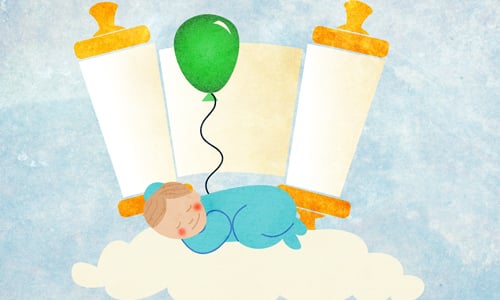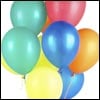While celebrating our birthdays may seem like second nature to most of us, the idea of marking one’s birthday as a time of celebration, reflection, and thanksgiving is relatively new in Jewish history.
The Midrash records that the dedication of the Tabernacle was delayed to coincide with Isaac’s birthday,1 and the Jerusalem Talmud teaches that one’s fortune is particularly strong on one’s birthday.2
In the Purim story, Haman assumed the month of Adar would be a propitious time to kill the Jews because Moses’ passing happened during that month. He was thwarted however, by not realizing that Moses was born and died on the same date, and rather than proving an unlucky month for the Jews, the birth of the greatest leader in history presaged a time of good fortune for our people.3
But aside from these, and a few recorded instances of our Sages hosting gatherings in honor of occasional milestone birthdays, the concept of celebrating a birthday annually—let alone attributing much significance to it—was virtually unheard of for millennia.
That slowly started to change with the advent of Chassidism, when the Baal Shem Tov, followed by all the Chabad Rebbes, observed their birthdays, albeit always in a private manner in the presence of only a select few.4
So unknown was the significance of one’s birthday, that when the Sixth Rebbe, Rabbi Yosef Yitzchak Schneerson, of righteous memory—at the time still a child—mentioned to his private tutor that it was his birthday, the teacher responded, “Since when is a birthday so special? The Gemara says it would be more pleasant for us to have not been created!”
At dinner that evening, when the young Yosef Yitzchak shared this conversation with his father, Rabbi Shalom Dovber, known as the Rebbe Rashab, of righteous memory, he responded, “[the teacher] does not know everything. A birthday is indeed very special.”5
Awareness Begins
Decades later, in the final years of his leadership, Rabbi Yosef Yitzchak revealed publicly that the Rebbes had all observed their birthdays, and encouraged others to do so as well.6
With the publication of Hayom Yom in 1943 came the first official instruction: “On a birthday, spend time in seclusion. Recall you experiences and think deeply into them. Then repent and correct those deeds that need correction and repentance.”7
Throughout the years of his leadership, the Rebbe gave the Jewish birthday more prominence.
Each year, the Rebbe marked his and his wife’s birthdays (Nissan 11 and Adar 25 respectively) by visiting the gravesite of his father-in-law, the Sixth Rebbe. On his 50th birthday, in 1952, the Rebbe delivered a chassidic discourse, and, ten years later, on his 60th birthday, he held a special farbrengen. Starting in 1971, the Rebbe held a farbrengen or delivered a discourse every year on his birthday.
The Rebbe also initiated the custom of granting private audiences to people in honor of their birthdays, during which he conveyed many of the Jewish birthday customs, such as increased Torah study and charity, and receiving an aliyah.
When Rabbi Berel Baumgarten attended a private audience for his birthday in the summer 1954, the Rebbe asked him if he had received an aliyah on Shabbat before. When he answered in the negative, the Rebbe asked, “Why not? I thought everyone was aware of my request [to do so]!”
Chassidim began to mention their upcoming birthdays in their letters to the Rebbe, and the Rebbe would similarly respond with special blessings and instructions for how to observe the day.
In later years, when the Rebbe began to distribute dollars, people would attend in honor of their birthday, and they would receive an additional dollar and the Rebbe’s blessing for a successful year.
The Birthday Campaign Is Born
A month after the passing of his wife, Rebbetzin Chaya Mushka, in 1988, on what would have been her 87th birthday, the Rebbe introduced two new traditions, adding that teaching and observing the birthday customs “will be the greatest merit for her soul.”
- Every individual should host a farbrengen in connection with their birthday. A farbrengen involves gathering friends and family to wish l’chaim and make meaningful resolutions for the coming year.
- Parents should observe these customs with their young children, especially hosting farbrengens and parties with their friends, which will increase their excitement in all areas of observance.8
Shortly thereafter, a detailed list of 10 birthday customs, compiled from the Rebbe’s talks and letters, was edited by the Rebbe and publicized.9
Thus, the Jewish Birthday Campaign was born.
Read: What Is a Jewish Birthday?
The Campaign Spreads

The Rebbe used every opportunity to spread awareness of the importance of celebrating one’s Jewish birthday.
During the intermediary days of Passover that year, a Yiddish advertisement was prepared for the Algemeiner Journal—titled “Do not miss out on observing the most important day of your life!”—calling upon every Jew to mark their birthday with the significance it deserves. The Rebbe edited the memo and instructed that it be translated into Hebrew and English as well.
Additionally, Lubavitch Youth Organization published a full-page ad in The New York Times, also edited by the Rebbe, titled “Birthdays Matter.” Lubavitch Youth in Israel likewise launched an ambitious birthday campaign, reaching tens of thousands of children around the country.
During the Moshiach Meal on the last day of Passover that year, the Rebbe delved into the various Torah sources and rationale for publicly celebrating birthdays.10 And while giving out dollars, the Rebbe would regularly remind children and adults to host a party or farbrengen in honor of their birthday.
The birthday campaign, spread by teachers, emissaries, and yeshiva students, in their respective communities, was very well received. Thousands were inspired to utilize their birthday to grow in their observance, heartwarmed that someone was thinking of them on their special day.
Story: When Is Your Birthday?
Here are some ways to celebrate your birthday as suggested by the Rebbe:
Note: All these suggestions should be implemented on your Jewish birthday. Use our Jewish/Civil Date Converter to find out when your Jewish birthday is.
-
Giving charity should be a daily event. On your special day increase the amount of your contribution, especially before the day's morning and afternoon prayers. If your birthday falls on Shabbat or a Jewish holiday when handling money is forbidden, give the added charity beforehand and afterwards.
-
Spend some extra time praying, focusing on meditating and concentrating on the words of the prayers.
-
Say as many Psalms as possible. Ideally, you should try to read the whole book, or at least complete one of its five books (Psalms is divided into five books).
-
Study the Psalm that corresponds to your new year. This is your age plus one — e.g. Psalm 25 if this is your 24th birthday. Click here to study it online. This is also the Psalm which you should try to say daily until your next birthday.
-
Take some time out to contemplate on your past year. Consider which areas require improvement, and resolve to do so.
-
Learn some extra Torah on this day.
-
Study a Chassidic idea and repeat it at a gathering in honor of your birthday. Follow the following links for Short Insights, or some Essays.
-
Partake of a new fruit which you did not yet taste during this season and recite the Shehecheyanu blessing.
-
Take the time to teach another something about Torah and Judaism.
-
Commit yourself to doing a particular good deed. Choose something practical and doable! Click here for some ideas.
-
Men and boys over the age of thirteen: On the Shabbat beforehand, get an aliyah in the synagogue. If the birthday falls on a day when the Torah is read, be sure to receive an aliyah on that day too.
Click here for more information on birthdays.
Have a happy and meaningful birthday!








Start a Discussion